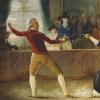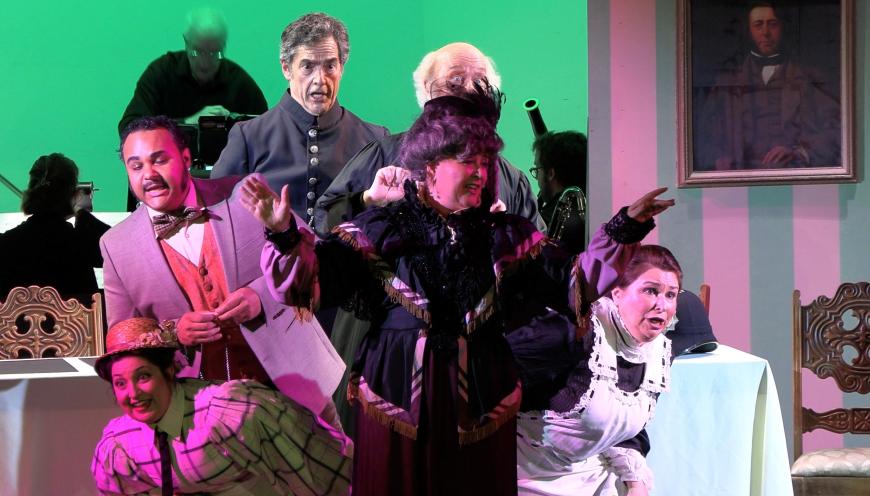
Pocket Opera has long wanted to include Benjamin Britten in its repertoire, and I was glad to hear the company had. But I was skeptical of the choice of Albert Herring. Simply put, not much happens in it. But that makes it easier to produce. And since Britten and librettist Eric Crozier set their story around the celebration of May Day, this performance on Sunday afternoon at the Gunn Theater at the Legion of Honor was timely.
The story of Albert Herring, as Pocket Opera’s introduction admitted, is “silly.” It’s a comedy of manners, seemingly intent on satirizing the stringent morality and class consciousness of a village in England’s East Suffolk, where Britten was born and raised. It’s not surprising to find this sort of framing populated by stereotypical and rather flat characters. In dramatic terms, most of the characters in Albert Herring seem to develop less over the course of the opera’s three acts than those in Mozart’s similarly spirited and much older Così fan tutte.
Bravo, then, to Britten for enhancing the ephemeral tale and its rather ephemeral and repressed title character with well-wrought and generally engaging music. And bravo to Pocket Opera, Music Director David Drummond, and Stage Director Nicolas A. Garcia for investing their production with energy and talent.
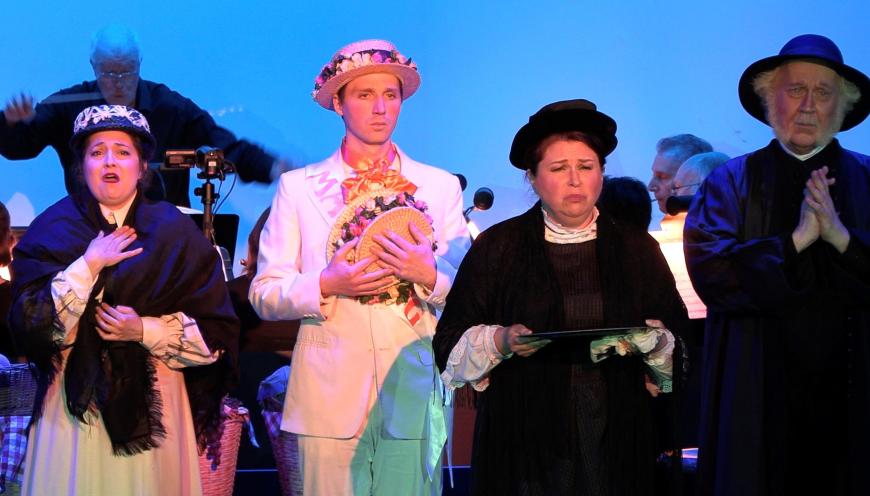
The 13-person Pocket Philharmonic, including Drummond on piano, accompanied from the rear of the stage with consistent timeliness and accuracy of intonation. The clarity and strength of Caroline Altman’s soprano, in the role of the imperious Lady Billows, were evidenced from the outset in her commands from offstage to her bustling housekeeper Florence Pike, affectingly characterized by mezzo-soprano Kathleen Moss. The interior of m’lady’s breakfast room was simply but impressively set. The production’s equally successful turn-of-the-century costuming was evidenced by the arrival onstage of the town’s vicar, mayor, police superintendent, and teacher.
These four are the members of a committee set to select a Queen of the May from among the village youth. Their interaction with Billows and Pike, though dreary in its moral condemnation of the youthful candidates, showcases Britten’s trademark fluency in writing for mixed voices — and also showcased the individual talents of the Pocket players. Lee Strawn invested Gedge the Vicar with a particularly sweet, lyrical baritone, and soprano Chelsea Hollow was a clarion Miss Wordsworth, the church school’s teacher.
The second scene of Act 1 introduces an amorous young couple, the ingenuous butcher’s assistant Sid (baritone Julio Ferrari) and bakery clerk Nancy (mezzo Courtney Miller). Ferrari and Miller were warmly engaging, almost as if they belonged in some other opera. Their interaction in Mrs. Herring’s grocer’s shop may have stolen the scene away from the opera’s titular character, who makes a rather wimpy appearance as an employee, and emotionally stunted possession, of his widowed mother. Sam Faustine, though, effected a vibrant musical impression as Albert, in a plaintive high tenor.
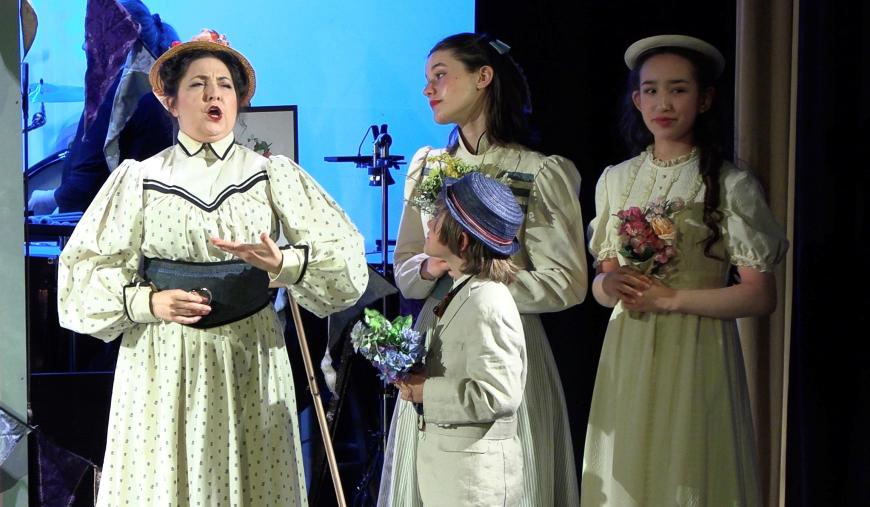
The scene was brightened by a trio of village children, charmingly vocalized and friskily enacted by Zora Day-Friedland, Alliana Lili Yang, and James Coniglio. Mezzo Mary Rauh as Mrs. Herring credibly conveyed both her domination of Albert and her surprise in being visited by Billows and the committee with the news that her son had been named May King, by dint of the unsuccessful search for a virtuous queen.
A tone-true passage on French horn by Kyle Ko introduced Act 2, in which Albert is coronated in the vicarage garden. Once again, the mannered comedy may seem overextended, posing an inherent challenge to director Garcia not to let the action lapse into mawkishness. Faustine drew audience titters with Albert’s farcical plot point of imbibing punch spiked by Sid and Nancy. The children lent charm to the ceremony, and in her role as their teacher and conductor, Hollow artfully channeled a bit of bel canto whimsically interpolated by Britten. Some of the opera’s best music occurs in a few interludes, briefer and less dynamic than those in Peter Grimes but marvelously imaginative and well read by Pocket Opera’s chamber orchestra.
The cast members doubled as stagehands, returning the scene to the grocery store on the evening of that May Day. Albert, still new to the influence of alcohol, has a reflective solo, with Faustine showcasing an emotional honesty so evident in Britten's other operas. This launches Albert, temporarily uninhibited and unaccompanied, out onto the streets of the village, and in Act 3, all the characters are preoccupied with the search for the missing Albert.
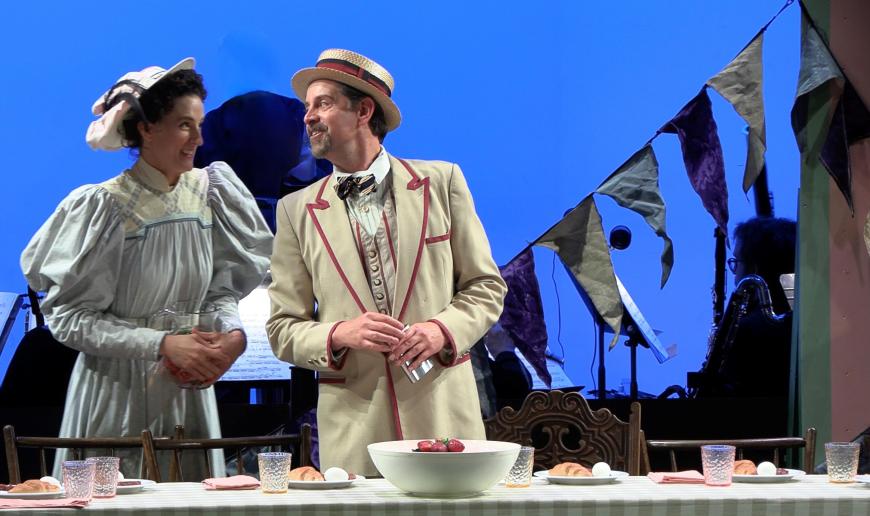
Again, there was for this reviewer ambiguity in how to get a grip on the dramatic intention of the plot. Although some of the characters give voice to the possibility that Albert is “dead and gone,” we haven’t really been given any reason to suspect this, and despite an uncharacteristic moment of nostalgia by Mrs. Herring, we don’t know how most of the others feel about Albert. As elsewhere in the opera, Britten and Crozier somewhat save the day with an impressive requiem-scale threnody, the nine fine voices of the Pocket Opera cast probing the juxtaposition of life and death.
But ambiguity returns with the reappearance of Albert, solemnity giving way to general outrage, including from his mother. But not from Sid and Nancy, who again resonate as the most sympathetic and likeable souls in this village. Although we can’t completely gauge how Albert himself processes his sodden offstage adventure, we’re led to think he might have made a good try at growing a bit more robust and interesting — and giving his opera a retroactive raison d’être. That made for a happy ending, roundly applauded by a full house.


